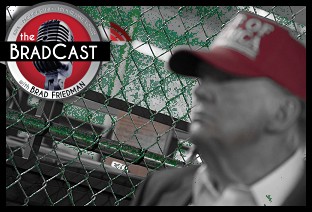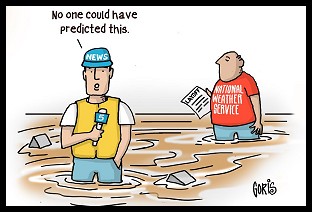 At the BRAD BLOG and on today's BradCast, we'll even fight for Donald Trump's right to vote --- even from prison, should he find himself there at any time in the near-ish future. [Audio link to show follows below.]
At the BRAD BLOG and on today's BradCast, we'll even fight for Donald Trump's right to vote --- even from prison, should he find himself there at any time in the near-ish future. [Audio link to show follows below.]
But, first up today, a bit of impeachment-related news, even as Congress is on recess for the Thanksgiving holiday. The House Judiciary Committee (as opposed to the House Intelligence Committee) has announced a new impeachment hearing for next Wednesday. Judiciary Chair Jerrold Nadler sent a letter to the President on Tuesday, inviting him and his counsel to attend and potentially question witnesses in the hearing titled Titled "The Impeachment Inquiry into President Donald J. Trump: Constitutional Grounds for Presidential Impeachment." Along with his invitation, Nadler also offered a warning about the White House's continued refusal to make witnesses and documents available to the Constitutional proceedings in the U.S. House.
In related news, Trump's Dept. of Justice on Tuesday filed for a stay to a blistering federal court ruling ordering that former White House Counsel Don McGahn appear for scheduled testimony in response to a lawful Congressional subpoena regarding the House's examination of the Robert Mueller investigation. McGahn played a key role in the probe, helping to detail Trump's multiple attempts to obstruct the Special Counsel's investigation of Russian interference in the 2016 election and Team Trump's cooperation with the effort.
The DoJ is now seeking a pause pending an appeal to U.S. District Judge Ketanji Jackson Brown's scathing 121-page ruling [PDF] issued on Monday, in which she eviscerated the DoJ argument that Presidents and their current and former White House officials enjoy "absolute immunity" from Constitutionally-mandated Congressional oversight. "Stated simply," the Judge wrote, "the primary takeaway from the past 250 years of recorded American history is that Presidents are not kings."
Trump, however, appears to feel otherwise. In addition to appealing the order, Trump tweeted today that "The D.C. Wolves and Fake News Media are reading far too much into people being forced by Courts to testify before Congress," adding that while he "would love" to have top Executive Branch officials like Sec. of State Mike Pompeo, acting Chief of Staff Mick Mulvaney and former National Security Advisor John Bolton testify in impeachment hearings in the Ukraine bribery affair, he is only "fighting for future Presidents and the Office of the President. Other than that, I would actually like people to testify."
But whether Trump wins his "absolute immunity" defense while President, it is unlikely to help him once he is out of office. To that end, yes, we'd hate to see him lose his right to vote if he ever should find himself imprisoned for any of his countless crimes. In the meantime, however, there are millions in prison who have already lost that right --- a right, not a privilege, even if many treat it that way --- while behind bars. There has been some noteworthy successful (and even bi-partisan in some cases) efforts of late in a number of states to help enfranchise former felons or those out of jail on probation or parole though state constitutional amendments, legislation or executive actions. But when it comes to the right to vote for those still in prison, the debate has been slower and more contentious. Currently, only Maine and Vermont allow prisoners to vote, a policy which Vermont's U.S. Senator Bernie Sanders strongly defended during a CNN Presidential Candidate Town Hall earlier this year.
At the same time, as our guest today, DANIEL NICHANIAN, Editor of The Appeal Political Report (better known as @Taniel on Twitter) points out, lawmakers in eight states and D.C. have filed legislation this year to allow people behind bars to exercise the right to vote. Rep. Ayanna Pressley (D-MA) has done the same at the federal level.
After a Republican New York state Assemblyman recently described a state Senate bill there that would enfranchise convicts as "insulting [to] members of law enforcement and the criminal justice system who worked diligently to get these dangerous predators off the street," Nichanian reached out to prosecutors, correctional facility officers and elected officials in Maine and Vermont to see if they agreed. You'll be surprised to learn that not one of them did, with almost all either finding it to be no problem or, more frequently, lauding the connection to "the real world" that voting allows imprisoned citizens as they pay their debt to society.
Nichanian, a Senior Fellow at the Justice Collaborative and expert on criminal justice reform and mass incarceration, shares insight from the officials he spoke with, and explains why reform on this issue (which disproportionately affects minorities) --- and a number of related topics --- is long overdue.
"We are not treating the right to vote as an inalienable, fundamental right of U.S. democracy, as a right that every citizen should have, and have protected," he tells me, explaining why "ending felony disenfranchisement would also mean that law enforcement professionals are no longer the arbiters of who gets to exercise democratic rights."
Nichanian notes that "the way in which we talk about people who are incarcerated, it would seem like we forget that these people have families, they have kids who go to school, and the school board elections matter to them. They have families who also need to care about their elected officials."
"There's all sorts of arguments of whether people are worthy of voting or not, whether people have shown enough civic capacity to vote or not," he argues. "And I find all of that universe of questions to be questionable, because we are claiming for ourselves the power and authority to decide whether our fellow citizens should have the same rights as us. I find that to be a problematic question. And I think that's just the bottom line: whether we want the right to vote to be a protected right for all U.S. citizens."
He says that "we are definitely seeing the criminal justice reform conversation encompass these issues of rights restoration, as a tool of re-entry, as a tool of thinking about how people remain human, as a way of thinking about economic justice and racial justice throughout the process." But whether that, theoretically bipartisan effort will ultimately become a fight for re-enfranchising felons remains to be seen.
We also discuss how the imprisoned population is used in the fight over apportionment, with the incarcerated counted in the census and for redistricting purposes, even while that huge chunk of the population is disallowed from exercising any real political power through the vote. "The time to address it is literally now, because the next round of redistricting and map-drawing is coming up. If this is going to be reformed, it has to be in the next couple of years, or else we'll have ten more years of problems on this."
Finally, Desi Doyen joins us today for our latest Green News Report as "climate emergency" is named "Word of the Year" by the Oxford Dictionary and, unfortunately, for very good reason...
(Snail mail support to "Brad Friedman, 7095 Hollywood Blvd., #594 Los Angeles, CA 90028" always welcome too!)
|


 Repub Support for Immigrants Skyrockets Amid Trump's Crackdown: 'BradCast' 7/14/25
Repub Support for Immigrants Skyrockets Amid Trump's Crackdown: 'BradCast' 7/14/25  Sunday 'Totally Predictable' Toons
Sunday 'Totally Predictable' Toons Democracy STILL Our Best Way Out of This Mess -- And Repubs Know It: 'BradCast' 7/10/25
Democracy STILL Our Best Way Out of This Mess -- And Repubs Know It: 'BradCast' 7/10/25 'Green News Report' 7/10/25
'Green News Report' 7/10/25
 'Mass Shooter Subsidy'?: More Dumb, Deadly Stuff in Trump's New Law: 'BradCast' 7/9/25
'Mass Shooter Subsidy'?: More Dumb, Deadly Stuff in Trump's New Law: 'BradCast' 7/9/25  Trump's New Law Supersizes ICE, Mass Detention, Militarization: 'BradCast' 7/8/25
Trump's New Law Supersizes ICE, Mass Detention, Militarization: 'BradCast' 7/8/25  'Green News Report' 7/8/25
'Green News Report' 7/8/25 Texas Flooding Tragedy Was Both Predictable and Predicted: 'BradCast' 7/7/25
Texas Flooding Tragedy Was Both Predictable and Predicted: 'BradCast' 7/7/25 Sunday 'Big Billionaire Bonanza' Toons
Sunday 'Big Billionaire Bonanza' Toons Sunday 'Total Obliteration' Toons
Sunday 'Total Obliteration' Toons 'Green News Report' 6/26/25
'Green News Report' 6/26/25 Thank You For Your Attention to This Matter:
Thank You For Your Attention to This Matter: Mamdani Primary 'Win' Augurs New Era of Rising Progressives: 'BradCast' 6/25/25
Mamdani Primary 'Win' Augurs New Era of Rising Progressives: 'BradCast' 6/25/25 U.S. Authoritarianism Under-way (But We're Still Here to Fight It): 'BradCast' 6/24/25
U.S. Authoritarianism Under-way (But We're Still Here to Fight It): 'BradCast' 6/24/25 'Anti-War' Trump Attacks Iran on False Claims About WMD: 'BradCast' 6/23/25
'Anti-War' Trump Attacks Iran on False Claims About WMD: 'BradCast' 6/23/25 Senate Health Care Cuts 'More Extreme' Than House Version: 'BradCast' 6/19/25
Senate Health Care Cuts 'More Extreme' Than House Version: 'BradCast' 6/19/25 What 'Anti-War President'? MAGA Civil War Over Trump, Iran: 'BradCast' 6/18/25
What 'Anti-War President'? MAGA Civil War Over Trump, Iran: 'BradCast' 6/18/25 Trump's 'Remigration' is Code for 'Ethnic Cleansing': 'BradCast' 6/17/25
Trump's 'Remigration' is Code for 'Ethnic Cleansing': 'BradCast' 6/17/25 Last Weekend Today: 'BradCast' 6/16/25
Last Weekend Today: 'BradCast' 6/16/25
 VA GOP VOTER REG FRAUDSTER OFF HOOK
VA GOP VOTER REG FRAUDSTER OFF HOOK Criminal GOP Voter Registration Fraud Probe Expanding in VA
Criminal GOP Voter Registration Fraud Probe Expanding in VA DOJ PROBE SOUGHT AFTER VA ARREST
DOJ PROBE SOUGHT AFTER VA ARREST Arrest in VA: GOP Voter Reg Scandal Widens
Arrest in VA: GOP Voter Reg Scandal Widens ALL TOGETHER: ROVE, SPROUL, KOCHS, RNC
ALL TOGETHER: ROVE, SPROUL, KOCHS, RNC LATimes: RNC's 'Fired' Sproul Working for Repubs in 'as Many as 30 States'
LATimes: RNC's 'Fired' Sproul Working for Repubs in 'as Many as 30 States' 'Fired' Sproul Group 'Cloned', Still Working for Republicans in At Least 10 States
'Fired' Sproul Group 'Cloned', Still Working for Republicans in At Least 10 States FINALLY: FOX ON GOP REG FRAUD SCANDAL
FINALLY: FOX ON GOP REG FRAUD SCANDAL COLORADO FOLLOWS FLORIDA WITH GOP CRIMINAL INVESTIGATION
COLORADO FOLLOWS FLORIDA WITH GOP CRIMINAL INVESTIGATION CRIMINAL PROBE LAUNCHED INTO GOP VOTER REGISTRATION FRAUD SCANDAL IN FL
CRIMINAL PROBE LAUNCHED INTO GOP VOTER REGISTRATION FRAUD SCANDAL IN FL Brad Breaks PA Photo ID & GOP Registration Fraud Scandal News on Hartmann TV
Brad Breaks PA Photo ID & GOP Registration Fraud Scandal News on Hartmann TV  CAUGHT ON TAPE: COORDINATED NATIONWIDE GOP VOTER REG SCAM
CAUGHT ON TAPE: COORDINATED NATIONWIDE GOP VOTER REG SCAM CRIMINAL ELECTION FRAUD COMPLAINT FILED AGAINST GOP 'FRAUD' FIRM
CRIMINAL ELECTION FRAUD COMPLAINT FILED AGAINST GOP 'FRAUD' FIRM RICK SCOTT GETS ROLLED IN GOP REGISTRATION FRAUD SCANDAL
RICK SCOTT GETS ROLLED IN GOP REGISTRATION FRAUD SCANDAL VIDEO: Brad Breaks GOP Reg Fraud Scandal on Hartmann TV
VIDEO: Brad Breaks GOP Reg Fraud Scandal on Hartmann TV RNC FIRES NATIONAL VOTER REGISTRATION FIRM FOR FRAUD
RNC FIRES NATIONAL VOTER REGISTRATION FIRM FOR FRAUD EXCLUSIVE: Intvw w/ FL Official Who First Discovered GOP Reg Fraud
EXCLUSIVE: Intvw w/ FL Official Who First Discovered GOP Reg Fraud GOP REGISTRATION FRAUD FOUND IN FL
GOP REGISTRATION FRAUD FOUND IN FL

































